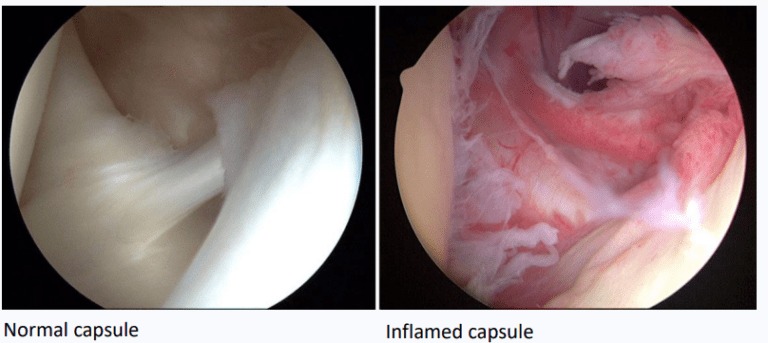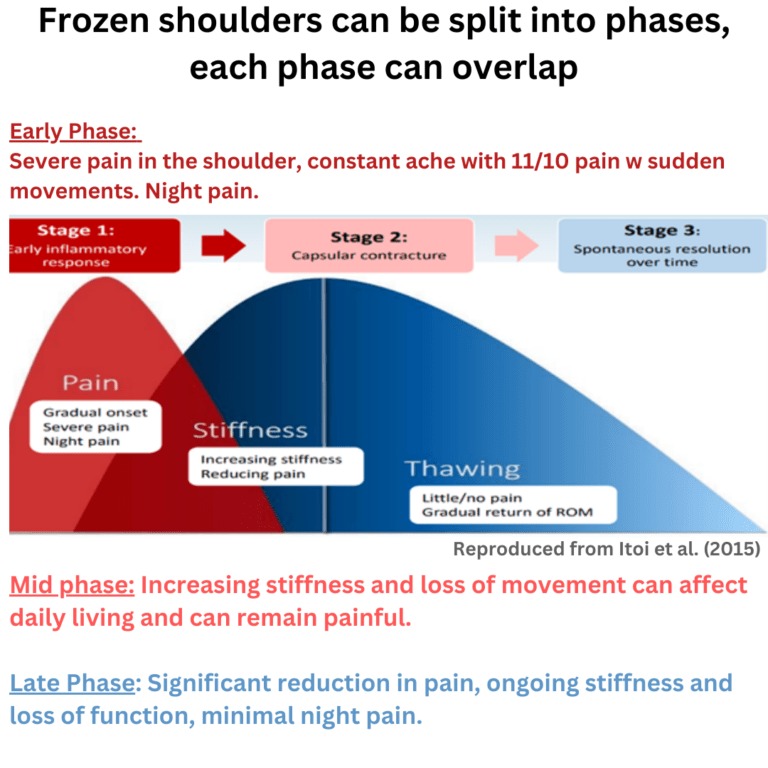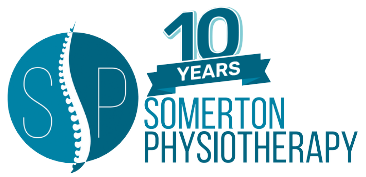Physiotherapy for Frozen Shoulder

Physiotherapy for Frozen Shoulder
Frozen shoulder is a common disorder that manifests as severe pain with a gradual loss of movement.
Frozen shoulder is believed to affect 2-5% of the general population with 8% of males and 10% of females affected.
The mean age of onset for frozen shoulder is 40-65 years and unfortunately has a 6-20% prevalence of affecting the opposite shoulder within 5 years. It rarely will affect the same shoulder twice.
The cause of Frozen shoulder still remains largely unknown, however it is likely caused by a multitude of varying factors such as genetics, mechanical, immune response and many others. Previous medical issues can also increase your risk of developing frozen shoulder. Medical issues that can lead to frozen shoulder are cardiovascular disease, stroke, and most notably diabetes with 60% of diabetes patients developing frozen shoulder. People with diabetes who develop frozen shoulder unfortunately have a higher risk of increased duration of frozen shoulder and increased severity of symptoms.
Other known potential risk factors for frozen shoulder include smoking, increased BMI levels and low levels of physical activity. Frozen shoulder primarily affects the capsule of the shoulder joint, causing a normal capsule to become inflamed and thickened thus reducing the movement of the shoulder joint.

Millar. N et al (2022) characterises frozen shoulder into three stages, as below:
First stage or AKA the painful stage. Is characterised by increasing pain with no/minimal limitations in movement of the shoulder. Pain is the most debilitating at this phase and can be worse at night. Patients will experience severe pain with quick or unguarded movements of the arm.
Second stage or AKA freezing stage. Is characterised by ongoing pain (but may not be as severe as the first stage) with a decrease in movement and function of the shoulder.
Third stage or AKA thawing stage. Is characterised by reducing pain and predominant stiffness in the shoulder. The patient will see a gradual return of function but be aware this may be a slow process.
The course of frozen shoulder can span over 1-4 years with the average lasting 30 months.

Image reproduced from Itoi et al. (2015)
“The diagnosis of Frozen shoulder can be attributed to out ruling any other potential cause of stiff shoulder” as per Cadogan et al (2022).
This is where physiotherapy for frozen shoulder can play a vital role in helping the patient come to a diagnosis of frozen shoulder. As many patients will present with shoulder pain and will also have reduced movement, it is vital that we do not jump to the diagnosis of frozen shoulder, as stated above many conditions can cause shoulder pain and reduced movements
In the early stages, pain can be diffuse and not only affect the shoulder, this can also be similar with shoulder joint osteoarthritis and rotator cuff related shoulder pain, pain can also arise from the neck. It is also important you see a physiotherapist who will screen for more serious medical conditions.
A physiotherapist will assess your shoulder movements, known as Range Of Motion (ROM). A physiotherapist will assess ROM on the affected shoulder and compare it to the non-affected side.

But how can physiotherapy for frozen shoulder help…?
You may think a stiff shoulder can just be stretched by a physiotherapist. However this approach in the early stages of frozen shoulder can actually lead to the shoulder becoming more restricted and painful, this is due to changes at a cellular level that occur in response to excessive stretching of the capsule.
In the early phases of frozen shoulder, a physiotherapist can help you understand and also educate you on frozen shoulder, they can also help you manage your pain and help you navigate your daily life without overly aggravating your shoulder. Your physiotherapist can also discuss other treatment options with you which are available to help with pain.
In the mid to late stages, as pain subsides and stiffness is the predominant complaint. Your physiotherapist can now help push you on with your rehab. Increased stretching and strengthening exercises can be introduced, with the aim to improve your ROM and address any strength deficits.
Throughout the entirety of the frozen shoulder process, your physiotherapist will help guide you through the ups and downs, our aim is to keep you as active as possible and involved in all your social outlets and sports.
You can now book an appointment at our Blanchardstown Physiotherapy Clinic, our Castleknock Physiotherapy Clinic or our Old Bawn Physiotherapy clinic through our website www.somertonphysio.ie, email us at i[email protected] or call us on 01 9069566.
Please do not hesitate to contact us if you have any questions.
You can follow us on our Facebook page and Instagram for more updates
